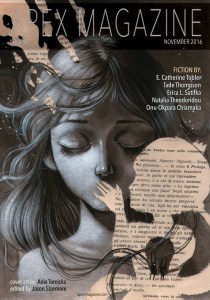 Apex Magazine #90, November 2016
Apex Magazine #90, November 2016
“Every Winter” by E. Catherine Tobler
Reviewed by Jody Dorsett
The 90th issue of Apex has four original short stories. Back in the dawn of the internet I was a participant in a group that discussed writing and Science Fiction and Fantasy writing in particular. One of the longest running topics was of the importance of plot over prose. I was firmly in the camp that a good plot is most important. However, I have moderated that position in that in some writing, particularly short fantasy, a vivid word picture can tell a powerful story. Call them modern parables if you will. The first three are such tales.
“Every Winter” by E. Catherine Tobler
Every winter Halla rents a villa by the river. It’s a large villa with many rooms but Halla lives there alone for the winter desiring no contact with others. She’s a painter with some success but brings no canvas with her. Just paint.
As she paints we see that she is suffering. The kind of suffering isn’t immediately clear nor is the person causing it. We also begin to see that this is not a new thing. That she has returned every winter to a place where she is tormented paints a picture with some interesting lessons in it.
“When She Comes” by Onu-Okpara Chiamaka
Ozokuandu is the greatest witch doctor in ten kingdoms and when death comes for him it takes the form of a sensuous woman. Ozokuandu is powerful and the woman is not. But she shows him that winning doesn’t always require brute force.
“The Island in the Attic” by Natalia Theodoriou
In this piece the author breaks the fourth wall and speaks directly to the reader. She tells the reader that what they get out of the story might actually be what is in them already. So the writing is a bit blurry in that there are disjointed paragraphs separated by a silcrow or section sign. Towards the end they start to fall into place and it takes the effort of the reader to make this picture complete.
“After We Walked Away” by Erica L. Satifka
This story takes two young people who are a couple on a journey. They grew up in a Utopia. They didn’t know what money was, there was no violence, there was no addiction but there was a price. Upon graduation they are shown the price the city pays to be a Utopian. They reject it and walk away. They are sent out into the world where there is money and violence and addiction. Where people are hateful and awful. They pay a price for this strange world. They try to go back but can’t. In many ways it reminds of a retelling of Paradise Lost but with a different outcome.